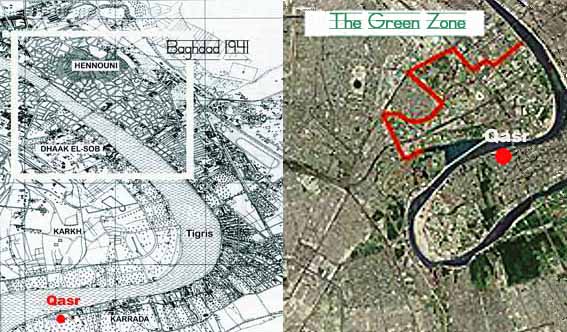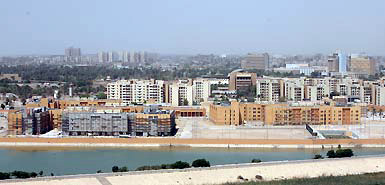2008: Postscript
THE PALACE (qasr ) in which Violette grew up was built by my grandfather some way across the river from what everyone called Dhaak el-Sob (a wasteland whose name meant, simply, ‘The Other Bank’). There was another empty area, Karkh, directly in front of them across the river to the north.

• How the area had developed by 1941 • How it appears today
More than twenty years ago when Mother first started making a few jottings of her most cherished memories in preparation for this book, Baghdad had already changed beyond recognition. She scribbled the following note:
All that I am telling you about does not exist any more. It was my Baghdad, my native
land where I grew up. Now it has been replaced almost altogether. Ninety per cent
of it has been erased like chalk on a blackboard and a new story is written.
By then the qasr had long been confined to history, confiscated and demolished in the creation of the modern city. A five-star international hotel, the Babylon, was built in its place, while the whole of the Karrada peninsula became the campus of the University of Baghdad.
Today, Baghdad is a city of ruins — of burnt-out homes, of shops wrecked by suicide bombs, of the crumbling shells of Saddam-era palaces and ministries (in the Karkh district and Dhaak el-Sob that once was nothing but huts and date-palms). They were key targets for the missiles that rained down in 1991 and 2003.
 The only major new construction lies directly in front of the spot where our qasr stood: the new United States Embassy, the size of Vatican City, built across the river within the 4 square mile ‘Green Zone’ where the Americans have managed to box themselves in. It is so well protected that the only place a photograph of it may be taken is from the rooftop of the Babylon Hotel, our old vantage point, seen in the foreground here.
The only major new construction lies directly in front of the spot where our qasr stood: the new United States Embassy, the size of Vatican City, built across the river within the 4 square mile ‘Green Zone’ where the Americans have managed to box themselves in. It is so well protected that the only place a photograph of it may be taken is from the rooftop of the Babylon Hotel, our old vantage point, seen in the foreground here.
Violette’s world is now totally erased — and from being a population of 150,000 nationwide at the time of the Farhud, those Jews of Babylon who have chosen to remain in the city can be counted on the fingers of two hands. The thousands who sought safe haven around the globe make their home today, ‘scattered like feathers from a pillow’, notably in Israel, the United States, Canada and Great Britain.
